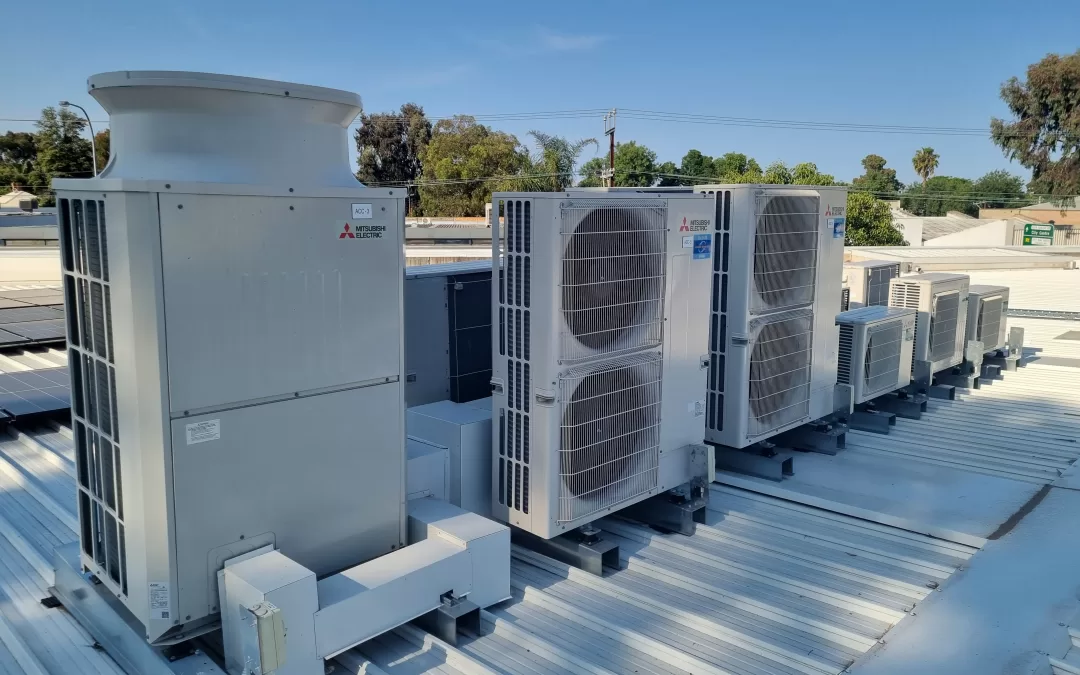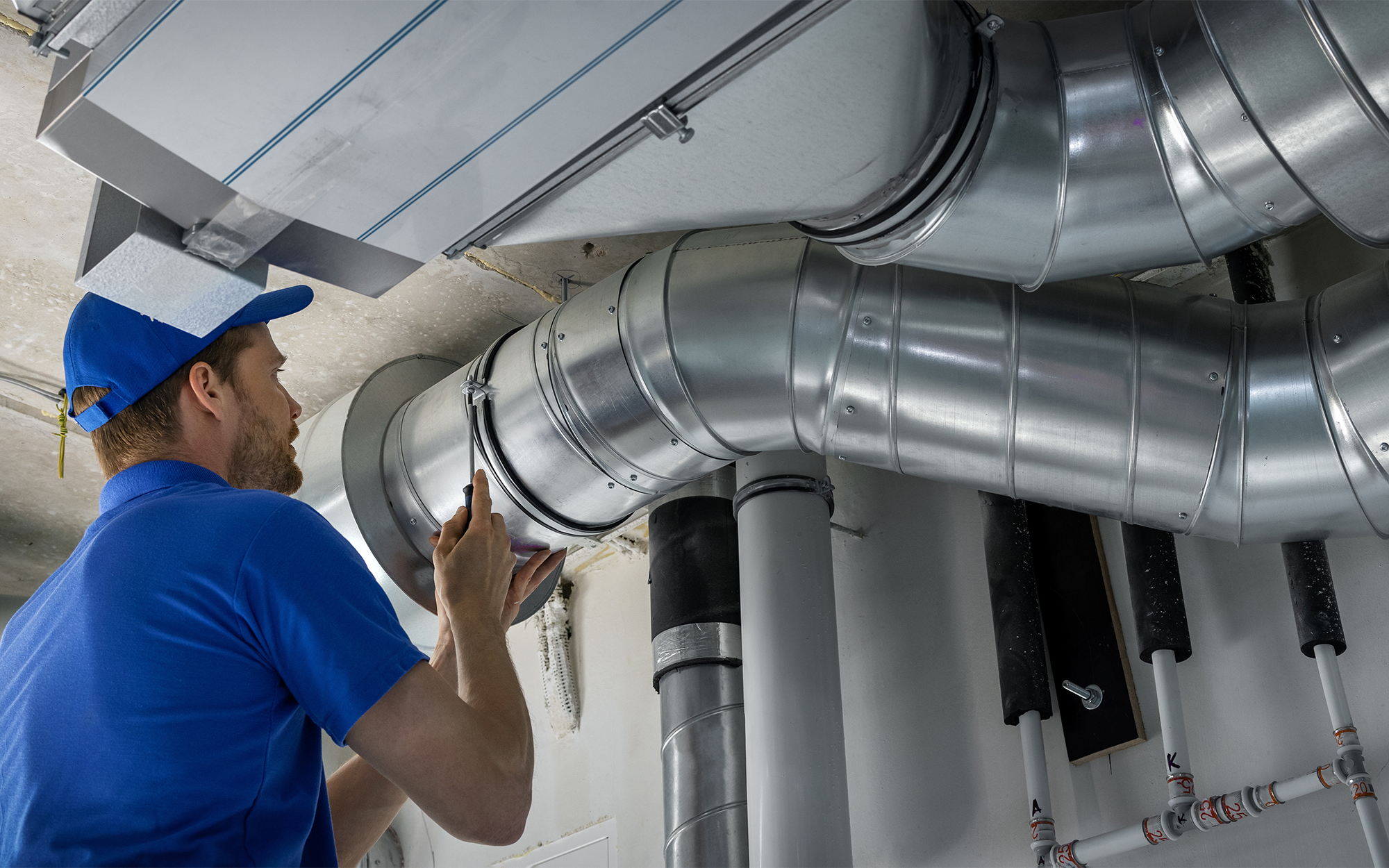Checking Out the Necessary Components of an Efficient A/c System
A reliable heating and cooling system is improved a number of vital elements that function in consistency. Each component, from the thermostat to the ductwork, plays an essential duty in preserving convenience and power effectiveness. Comprehending these aspects is vital for enhancing efficiency and improving interior air quality. As one examines these parts, the elaborate connections between them reveal understandings into improving total system effectiveness. What specific elements contribute most to this efficiency?
The Function of the Thermostat in Heating And Cooling Performance

Although typically overlooked, the thermostat plays an essential duty in the efficiency of cooling and heating systems. HVAC experts. This tiny gadget serves as the main nerve center, managing temperature setups and ensuring excellent convenience within a room. By properly picking up the ambient temperature, the thermostat communicates with the air, home heating, and ventilation conditioning devices to keep the desired environment
An efficient thermostat reduces power usage by activating the a/c system only when required, consequently avoiding too much home heating or cooling. Modern wise and programmable thermostats enhance this performance additionally by allowing customers to set timetables and from another location adjust setups, adjusting to everyday regimens.
The positioning of the thermostat is necessary; incorrect area can lead to imprecise temperature readings, resulting in ineffective operation. Generally, a well-functioning thermostat not just improves comfort yet additionally contributes markedly to energy cost savings and the long life of the a/c system.
Recognizing the Relevance of Air Filters
Air filters offer an essential feature in cooling and heating systems by guaranteeing that the air distributing within a space remains healthy and balanced and tidy. These filters catch dirt, allergens, and various other pollutants, avoiding them from being recirculated throughout the environment. By recording these particles, air filters add to improved indoor air high quality, which can substantially benefit passengers' health and wellness, specifically those with allergies or respiratory problems.
Additionally, maintaining clean air filters improves the performance of heating and cooling systems. Stopped up filters can limit airflow, causing the system to function more difficult to keep wanted temperature levels, bring about enhanced energy consumption and higher utility expenses. Regularly changing or cleaning filters is an essential maintenance step that can lengthen the life-span of cooling and heating equipment. Eventually, comprehending the importance of air filters permits property owners and structure managers to take proactive actions to ensure a well-functioning, reliable heating and cooling system that advertises a secure and comfortable indoor atmosphere.

The Functionality of the Furnace and Heat Pump
Heating systems and heatpump are important elements of heating and cooling systems, in charge of providing heat during colder months. Heaters run by heating air with combustion or electric resistance, after that distributing it throughout the home through air ducts. They generally offer rapid heating and can be fueled by natural gas, electrical energy, or oil, relying on the system kind.
Conversely, heatpump move warmth rather than generate it. They draw out warmth from the outside air or ground, also in reduced temperatures, and transfer it inside. HVAC experts. This twin capability allows heatpump to also provide cooling in warmer months, making them functional alternatives for year-round environment control
Both systems call for appropriate upkeep to guarantee efficiency and long life. While furnaces stand out in extreme chilly, heatpump can be advantageous in moderate climates. Comprehending their unique capabilities aids home owners in choosing the most ideal alternative for their home heating needs.
Exploring the A/c Unit
The air conditioning unit is an essential element of a/c systems, offered in numerous kinds to suit various needs. Recognizing the performance rankings of these units is important for making educated options concerning energy usage and cost. This area will certainly discover the diverse kinds of ac system and clear up how efficiency scores impact performance.
Kinds of Air Conditioners
While numerous elements influence the choice of cooling systems, comprehending the various kinds available is important for property owners and building supervisors alike. Central air conditioners are developed to cool entire homes or buildings, making use of a network of ducts for airflow. Home window units supply an even more localized remedy, ideal for small areas or solitary areas. Mobile air conditioning unit give versatility, enabling users to move the system as required. Ductless mini-split systems are an additional option, combining the efficiency of main systems with the comfort of zoning, as they call for no ductwork. Lastly, geothermal systems harness the planet's temperature for energy-efficient cooling. Each kind features distinctive benefits, making notified choices vital for effective climate control.

Effectiveness Rankings Discussed
Comprehending performance scores is necessary for picking the appropriate air conditioning device, as these metrics supply understanding right into the system's performance and energy consumption. One of the most usual score for ac system is the Seasonal Power Performance Proportion (SEER), which gauges the cooling output throughout a common air conditioning period divided by the overall electrical energy input. A higher SEER shows far better performance. In addition, the Energy Performance Proportion see here now (EER) is used for gauging efficiency under certain problems. Another vital metric is the Energy Celebrity accreditation, which signifies that an unit meets rigorous energy efficiency standards. By evaluating these ratings, consumers can make enlightened choices that not just maximize convenience yet additionally reduce power prices and ecological influence.
The Relevance of Ductwork and Airflow
Effective ductwork style and airflow monitoring play crucial duties in the total performance and efficiency of HVAC systems. Appropriate ductwork guarantees that check my source conditioned air is dispersed evenly throughout an area, lessening temperature changes and enhancing comfort. Properly designed air ducts decrease resistance to air flow, decreasing the workload on HVAC tools and eventually decreasing power consumption.
Air movement administration includes purposefully putting vents and registers to improve the circulation of air. This prevents typical issues such as chilly or warm areas, which can occur when air flow is obstructed or improperly well balanced. Furthermore, the right duct products and insulation can further enhance performance by decreasing warm loss or gain throughout air transportation.
A reliable ductwork system not just adds to power cost savings however can likewise extend the life expectancy of HVAC devices by minimizing unnecessary strain (HVAC experts). Subsequently, recognizing the significance of ductwork and air movement is important for achieving peak HVAC system efficiency
Regular Maintenance Practices to Enhance Efficiency
Regular maintenance techniques are important for ensuring peak performance of heating and cooling systems. These practices consist of routine evaluations, cleaning, and essential repair work to maintain the system running effectively. Regularly transforming air filters is essential, as stopped up filters can block air flow and decrease performance. On top of that, service technicians must check and clean evaporator and condenser coils to stop getting too hot and energy wastage.
Yearly professional assessments are also suggested, as trained specialists can determine possible concerns before they rise. Lubricating relocating parts reduces damage, adding to a much longer lifespan for the system. Additionally, making certain that the try here thermostat works correctly help in preserving suitable temperature control.

Often Asked Concerns
Exactly how Frequently Should I Change My Thermostat?
Thermostats must commonly be replaced every 5 to one decade, relying on use and modern technology innovations. Regular checks are suggested to ensure peak performance, particularly if experiencing irregular temperature control or raised energy prices.
What Size Air Filter Is Best for My Heating And Cooling System?
The best dimension air filter for a cooling and heating system differs by device layout. Typically, it's essential to consult the proprietor's guidebook or examine the existing filter measurements to assure peak efficiency and air top quality.
Can I Mount a Heat Pump Myself?
Installing a heatpump individually is possible for experienced individuals, but it needs expertise of regional codes and electrical systems. Employing an expert is recommended to guarantee correct setup and ideal system performance.
Exactly how Do I Know if My Ductwork Is Effective?
To figure out ductwork efficiency, one ought to check for leakages, procedure air movement at vents, examine insulation top quality, and assess temperature distinctions between supply and return ducts. Specialist assessments can provide complete understandings right into general efficiency.
What Are Indicators My Cooling And Heating Requirements Immediate Maintenance?
Indications that a heating and cooling system needs immediate upkeep consist of unusual sounds, inconsistent temperatures, enhanced power costs, unpleasant smells, and constant biking. Resolving these problems without delay can protect against additional damage and assurance optimal system performance.
Air filters offer a crucial feature in HVAC systems by assuring that the air flowing within a room continues to be tidy and healthy and balanced. Additionally, maintaining clean air filters improves the effectiveness of A/c systems. Ductless mini-split systems are an additional choice, incorporating the efficiency of main systems with the comfort of zoning, as they need no ductwork. Recognizing effectiveness rankings is essential for choosing the right air conditioning unit, as these metrics offer insight into the system's efficiency and energy consumption. The finest size air filter for a HVAC system differs by unit style.